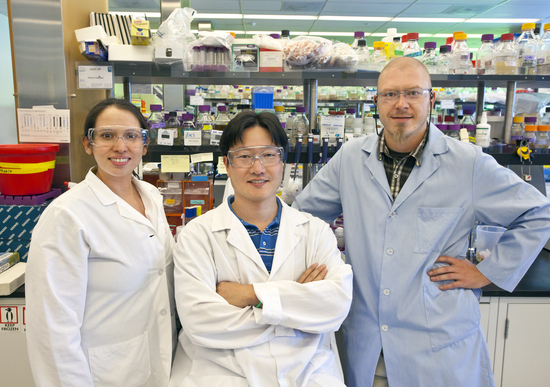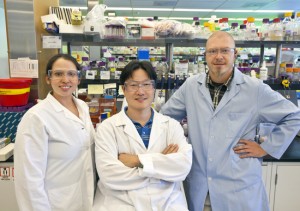“Two microbes, a bacteria, and a yeast” may sound like a recipe for a bad science joke, but it’s actually the formula that’s led researchers from Lawrence Berkeley National Laboratory and the Department of Energy to produce a new source for biodiesel.
Working together under the umbrella of the DOE’s Joint BioEnergy Institute (JBEI), a team of researchers have successfully engineered bisabolane into a biosynthetic alternative for making diesel.
There’s a good reason the scientists involved in the project stand like a proud group of superheroes in their most recent lab photo (see above). The potential biofuel source they’ve developed is something quite distinct.

Unlike almost all the other experimental biofuels that have been derived from sugars and engineered plant materials, bisabolane is derived from engineered microbial cultures.
Lee and his group used a mevalonate pathway to create “bisabolene,” the precursor to “bisabolane.”
“This is the first report of bisabolane as a biosynthetic alternative to D2 diesel, and the first microbial overproduction of bisabolene in Escherichia coli and Saccharomyces cerevisiae,” Taek Soon Lee, director of JBEI’s metabolic engineering program and a project scientist at Lawrence Berkeley.
The new type of fuel falls into the category of advanced biofuels–fuels developed from biomass that provide a renewable source for transportation fuel that can be used to replace substances including gasoline and jet fuels.
The breakthrough is sure to have caught the eye of many people in the industry, especially those in the military.
The U.S. military has taken a particular interest in advanced biofuel research as part of its green-tech push, seeing the alternative to traditional fuels as a potentially significant way to cut costs. About 81 percent of the military’s operational costs goes toward the purchase of jet fuel. In 2010, the Department of Defense spent $11 billion on liquid petroleum fuels, according to a recent report on military green-tech spending released by the Pew Charitable Trusts.
Details on how the team developed the new type of biofuel is detailed in the paper “Identification and microbial production of a terpene-based advanced biofuel” in the journal Nature Communications.
Source: cnet

 Follow
Follow